The forecast is dire — but the solutions we need to slow climate change will make us happier and healthier

The sky is clear and the sun is punishing.
A thick layer of ozone ripples above the pavement. No matter how much water you drink, you know you’re losing more through your pores whether you’re moving or not.
And for a lot of New Brunswickers, a province with more folks over 65 years of age than any other province, activity is out of the question.
It’s the fourth 30+ degree day in a row. You’re restless. Exhausted, despite having been shuttered inside, blinds drawn, melting in your chair, since the heat wave hit.
You’ve weathered these days before, over the years. But never in such succession. Never so persistent.
You feel depressed as you realize that there are fewer and fewer of those beautiful, tepid, liberating New Brunswick summer days, and it’s not going to get any better.
This is just life now.
An (un)real scenario
But it doesn’t have to be this way. The scenario described above is a science-based snapshot of where life is headed in New Brunswick if governments, businesses and industries don’t take serious action to limit carbon pollution causing the climate crisis we’re already experiencing.
How bad will it get? What will it mean for everyday life in New Brunswick? Who will suffer the most? Can we do anything about it?
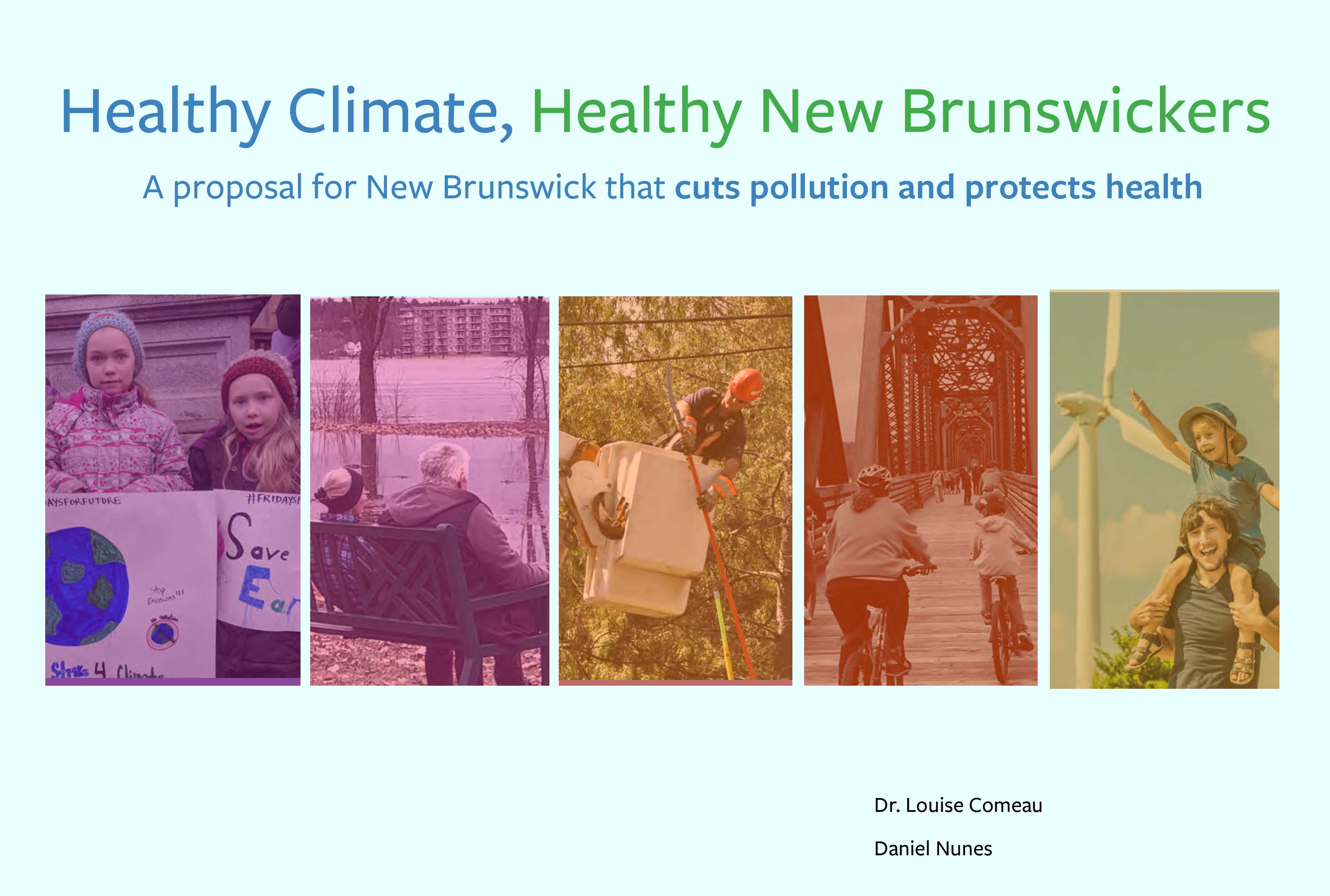 These questions are tackled in the Conservation Council’s new report from Dr. Louise Comeau,Healthy Climate, Healthy New Brunswickers: A proposal for New Brunswick that cuts pollution and protects health, released today (June 25).
These questions are tackled in the Conservation Council’s new report from Dr. Louise Comeau,Healthy Climate, Healthy New Brunswickers: A proposal for New Brunswick that cuts pollution and protects health, released today (June 25).
A spoiler for you: there is hope. There are concrete actions we can take to change the stark forecast described above and in the report.
But first, a look at what scientific research and health data in New Brunswick predicts about life in the picture province between 2021-2050.
The bad news
You may not think climate change is a public health issue. With the overwhelming focus on environmental degradation, species loss, and damage to public and private infrastructure, you could be forgiven. But when we combine existing research from sources such as the Canada Climate Atlas and New Brunswick Health Council’s community health profiles, among others, we get a sobering story indeed.
This is what Dr. Comeau does in our report, the first comprehensive look at how climate change will affect the physical and mental health of all New Brunswickers, but particularly the very young, seniors, the isolated, and those living on low incomes.
In the report, Dr, Comeau combines climate projections and existing community health profiles for 16 New Brunswick communities, including the Edmundston, Campbellton, Dalhousie, Bathurst, Caraquet, Miramichi, Moncton, Sackville, Sussex, Oromocto, Fredericton, Minto, Woodstock, Grand Falls, St. Stephen, and Saint John areas.
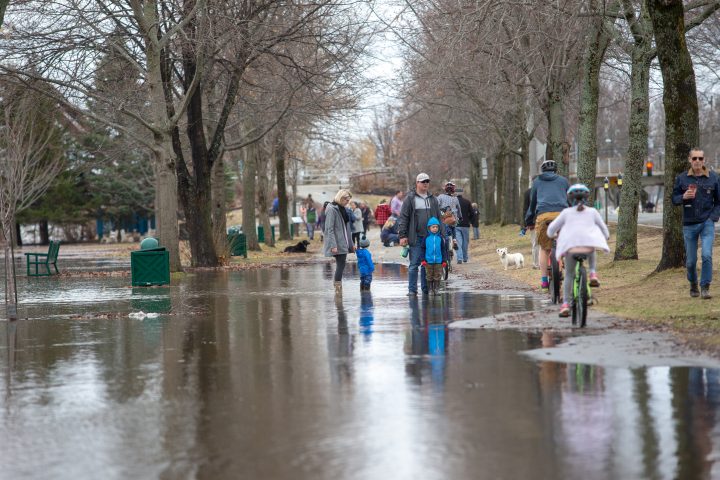
How’s the weather out there?
New Brunswickers aren’t used to hot, 30+ degree days, let alone long stretches of them. But that’s what the data says is coming in the immediate- to medium-term.
Comeau’s analysis shows that each of the communities listed above will experience between 122 to 300 per cent more 30+ degree days in the summer over the next 30 years if we don’t come together to eliminate the heat-trapping pollution causing global heating.
Fredericton, for example, can expect at least 20 of these scorching days a summer, compared to the 1976-2005 average of eight — up 150 per cent.
Bathurst could experience at least 14 hot days by 2021 to 2050, up from an average of six. The Miramichi and Minto regions will have 20 scorchers, Oromocto will have 21 (up from 9), Woodstock will have 15 (up from six), St. Stephen will have 11 (up from 4) and the Sussex area will have 12 (up from 4), to name a few.
This is a big departure from what is normal. Temperature influences natural cycles, our lifestyles and our physical and mental health.
We know heat waves, for example, can cause death in the elderly or sick as seen in recent years inEurope, theUnited States andQuébec. And then there’s the reality of hotter conditions exacerbating existing health conditions, or helping to cause them.
Health researchers from around the world find that climatic changes affect and contribute to cardiovascular disease and respiratory conditions (more air pollution, greater frequency of and more extreme forest fires, droughts and dust storms), allergic reactions (especially ragweed), cancer, traumatic injuries, vector-borne illnesses (from disease-carrying insects; think black-legged ticks), food and water-borne illnesses (contaminated water, prime conditions for bacterial growth), malnutrition, and mental health (being displaced from your home, grief from losing cherished possessions and property, and extreme weather-induced stress, anxiety and depression).
More frost-free days — but don’t get excited yet
Comeau’s analysis shows higher average temperatures, especially in spring and winter, increase the number of frost-free days per year. In New Brunswick, that means between 19-22 more frost-free days a year between 2021-2050, compared to the 1976-2005 average.
But don’t get excited yet.
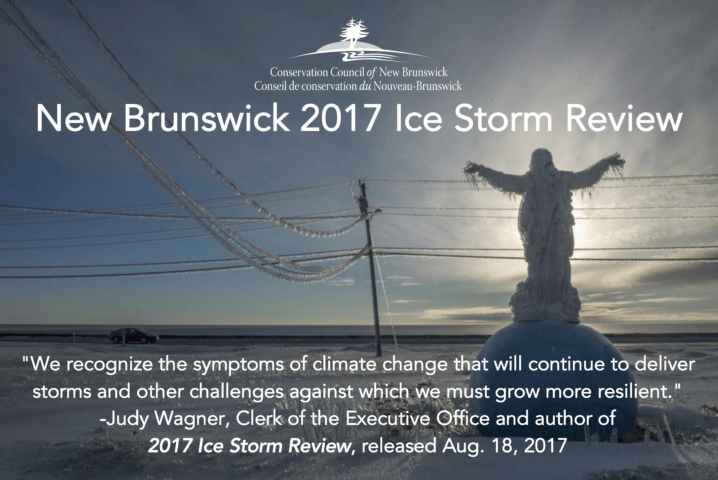
Warmer temperatures increase the risk of exposure to ticks carrying Lyme disease and pave the road for the expansion and establishment of othertick species and diseases. We’re seeing this already, especially in southern New Brunswick. In 2017, there were 29 confirmed cases of Lyme disease in the province, up from eight cases reported the year before.
More intense rainfall events, more extreme floods
Increases in temperature means more precipitation is forecast for New Brunswick in the coming decades. That’s because warmer air holds more moisture. Scientists calculate that for every one degree Celsius increase in temperature, the atmosphere can hold seven per cent more water.
What does this mean? Comeau’s analysis shows we are likely to experience less frequent but much more intense precipitation events, increasing the annual total volume of precipitation across the entire province.
This will mean more intense rainfall, more snow, and increases tosnow depth — adding to spring freshet worries and flood risk. It also means more freezing rain causing winter flooding and ice jams, and ice-on-snow cover making walking dangerous, especially for seniors.
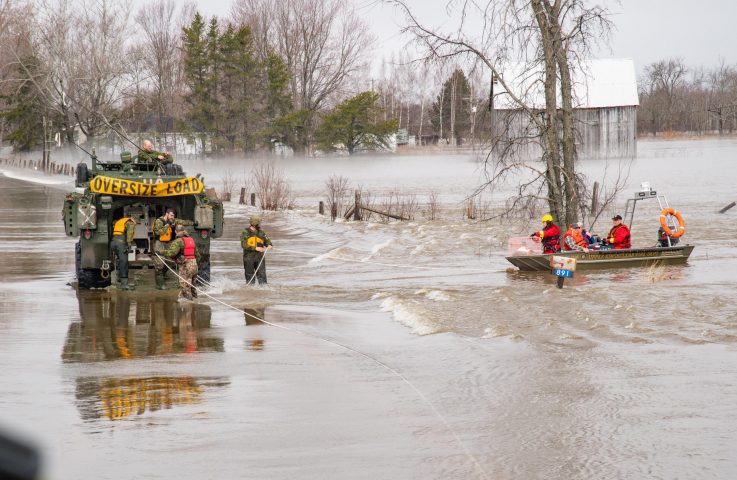
New Brunswick experienced record-breaking floods along the Wolastoq (St. John) River in 2018 and 2019, partly caused by above average snowpack and rain (at least partly due to our changing climate). There are, of course, other factors, such as land-and-forest use, and poor development planning in flood plains that, combined with natural variability and super-charging by climate change, increases the probability of extreme events, including flooding.
Projections show we’re likely to see the amount of rain falling in spring increase seven to nine per cent in the immediate to medium-term, with the amount of snow, rain and freezing rain in winter increasing eight to 11 per cent (with the higher amounts in northern communities).
Recently, University of Moncton hydrologistNassir El-Jabi told CBC he estimates frequent but minor floods could see water levels increase 30 to 55 per cent by 2100 in New Brunswick, and extreme floods like those in 2018 and 2019 could be 21 per cent bigger by 2100.
As Comeau writes in our report, “It is getting hotter, wetter, extreme, and less safe because greenhouse gas levels are not where they need to be and we are not changing the way we do things.”
Feeling down and out
We know young children and adults are increasingly anxious about climate change, as demonstrated by the global School Strike for Climate movement started by 16-year-old Greta Thunberg from Sweden. This winter and spring students in Fredericton, Moncton, Campbellton, Edmundston, Saint John and Sackvillejoined the movement, walking out of school to protest government and industry inaction on climate change.
Mental health professionals are increasingly worried about the psychological effects of climate change. Research shows climate change effects such as flooding and extended power outages can undermine well-being and cause ecoanxiety, a “chronic fear of environmental doom.”
Beyond the immediate stress and anxiety of disasters fueled by climate change, the chronic mental health affects these events bring about is even more frightening.
According to the American Psychology Association, these effects include post-traumatic stress disorder, depression, suicide, substance misuse, strained social relationships, aggression, violence, and feelings of helplessness, fear and fatalism — just to name a few.
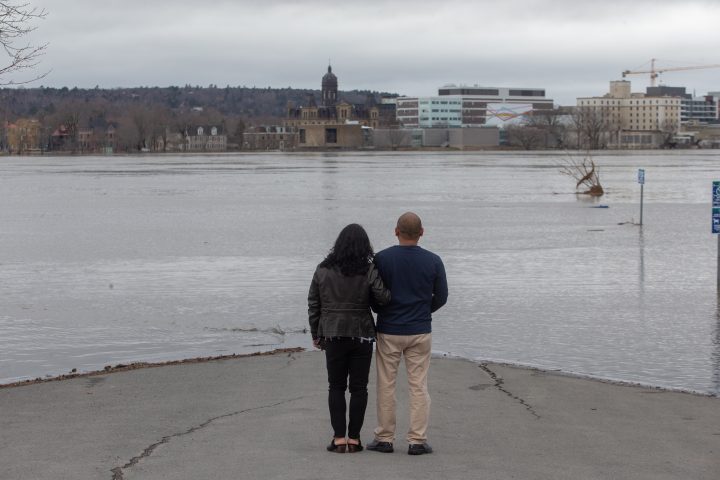
What’s this all mean?
If you are a senior or single parent living on low income, in an under-insulated home with no air conditioning, you are more at risk from extreme heat and extreme weather events. You might not have a vehicle to leave home, or you may have fewer social contacts to reach out to if the power goes out.
A senior woman living alone on a low income, with one or more chronic health issues, and who has few social contacts is especially vulnerable to the mental and physical health effects of extreme events made worse by climate change.
A person with asthma is more at risk from hotter days and more smog (heart and lung-damaging ground-level ozone).
New Brunswick generally has low levels of smog-related pollution. Communities like Saint John, Belledune and Edmundston, however, that house industrial operations (pulp and paper, coal-fired power, lead smelting, and oil refining), experience close to maximum levels for fine particulate matter and higher levels of smog.
Katie Hayes, a leading researcher focused on the mental health effects of climate change, points out in herrecent paper that the mental health effects of climate change are accelerating, “resulting in a number of direct, indirect and overarching effects that disproportionately affect those who are most marginalized.”
The good news — a better scenario
The sky is clear and the sun is punishing.
The mercury has breached 30 degrees, and you remember, 20-odd years ago, reading about the dire forecast that these days would become more and more the norm. You’re grateful that action, from communities to the highest levels of government and industry, didn’t let things get that bad.
All the same, on this day, you’re choosing to stay inside. You just can’t handle the heat like you could in your younger years.
But it’s beautiful. Specialized doors and windows, combined with a super-insulated attic, basement and walls, means you are comfortable no matter how hot or cold it gets outside.
You catch the glint of sunshine from the windshield of your electric car parked in the driveway. It’s charging from your rooftop solar panels and sleek battery bank on the wall, hidden by a painting from your favourite local artist.
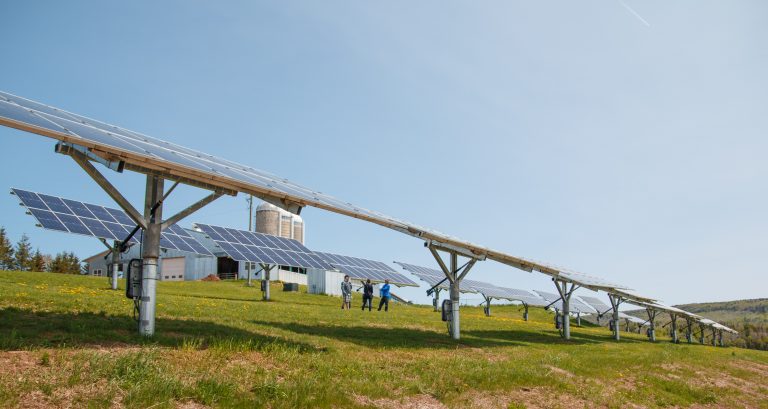
Even if you need more power than your panels and bank provide, you rest easy knowing it’s coming from a public utility powered entirely by renewable energy sources.
The coal-and-gas-fired power plants of yesteryear have long been shuttered, their workers enjoying a new gig in booming cleaner energy and technology sectors.
You hardly even think about air quality, not like you used to, then living next to Canada’s largest oil refinery in Saint John.
Cancer rates are down across the board, including places like the Port City, Edmundston and Belledune, once dogged by heavy, polluting industries.
You get up, head to the kitchen, and make a sandwich for lunch from vegetables grown just one block away, at one of several community gardens dotting the landscape.
You smile. This is just life now.
A new way on
There is no way around it — our lives depend on energy and always will. But we can control whether this energy comes from sources that pollute our climate and negatively affect our health, like coal, oil and gas, or sources that offer a much better balance with what our planet can sustain. This is a choice we can make.
Today, it’s a choice we must demand.
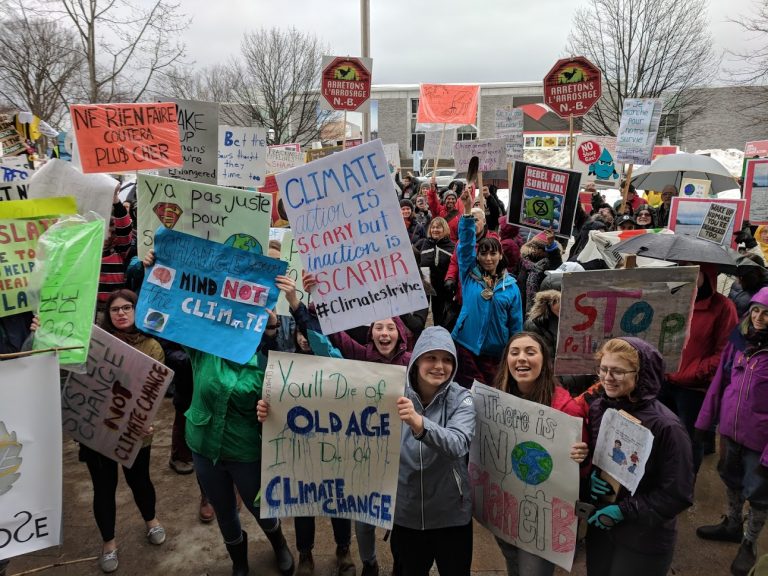
The Conservation Council’s climate change and health report, along with our climate action plan released in 2016, provide a blueprint for achieving the healthier, happier scenario described in the section above.
Slowing climate change will in turn fix so many social, environmental, health and labour problems that we can’t just look at it as a crisis — but as a tremendous opportunity to get things right.
Yes, the science-based projections are dire.
The Intergovernmental Panel on Climate Change says we’ve got about 10 years to get serious about solving the problems of climate change. And, even then, we’ll still be dealing with some of the effects.
But we can get it right, we can limit the suffering. We must not despair, and we must not be discouraged.
So what can you do right now?
Talk about climate change. Read the recommendations in Dr. Comeau’s report and share them with everyone you know.

By all means, do what you can in your home, life and workspace to limit the carbon pollution you add to the atmosphere. But the changes we have to make are bigger than better insulation and energy efficient appliances.
Dr. Comeau’s report encourages everyone interested in protecting public health from the immediate and looming effects of climate change to speak out and demand action from politicians, businesses, and industry.
There is a better way forward. It’s going to be hard work, but together, we can get there.
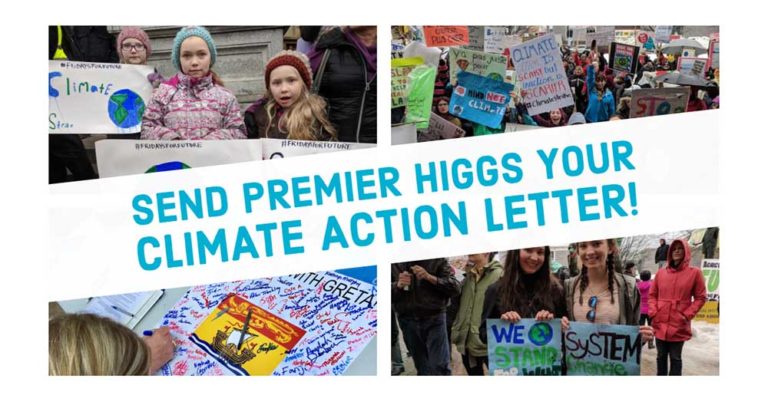
Click here to send your #climateaction letter
Recommended links: